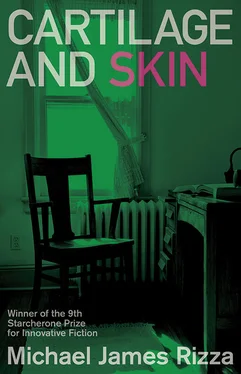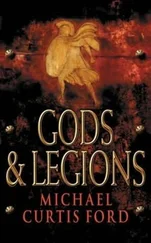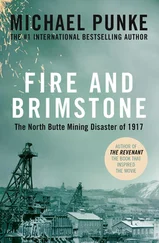Even after her voice ceased and her mouth settled into a mildly coquettish grin, I continued to watch her.
“Tell me something personal,” she said. “I just told you about my father.”
“He seems like a good man,” I said.
Vanessa smiled at my comment. “Now you,” she persisted.
“My father ruined himself with discontent,” I said. “So I don’t really have any good stories about him.”
“Then tell me a bad one,” she said sincerely, almost as if she were asking permission to collect me in her arms and protect me.
“From his phone bill,” I began, looking briefly at the wineglass, then back up to her waiting gaze, “I learned that out of the blue he called a few people he’d gone to school with or worked with, and even a couple of his old girl friends, and he just told them all that he was sorry. For what, I don’t know exactly. He apologized for things most of these people had forgotten about. Also, he sold all the tools and equipment in the garage in order to pay off his credit card debt. Sometime around dawn, because he’d set his alarm clock to get up really early, he spread a bunch of cardboard on the kitchen floor, so he wouldn’t make a mess, and he lay down and shot himself in the head — but it took him quite a few days to die. In the meantime, he was a crippled madman, always at the heightened pitch of terror. That’s my worst story.”
Vanessa reached across the table to hold my hand.
“I’m sorry I made you tell me that,” she said.
“It’s okay.”
“You don’t think I’m rude?”
“No.”
“I’ve never met anyone without at least one sad story to tell. It’s good to remember that. It keeps you more patient and kind, I think.”
“You’re very kind,” I said.
Vanessa’s fingers tightened upon my hand.
“Finish your wine, and I’ll take you home.” She turned in her seat to glance back into the living room. “Besides, I think they’d be happy to get some privacy.”
“I feel bad about having you drive me. I can walk. It’s not far,” I said because I had no intention of going back to my apartment, despite my father’s letter and the possibility that my mother had sent me a present in the mail. I had already checked the train schedule and planned my escape route, figuring that I could sleep throughout the night as I traveled.
“You can’t walk in this weather,” Vanessa said.
“I feel bad about you driving,” I said again, not to mention that my apartment was in the wrong direction.
“I can’t blame you for the snow. It’s been a bad season.”
I nodded, deciding not to refuse her offer a third time. I’d just have a longer walk. As we drank our wine, I knew that there was no way I could ask this woman to come with me. After all, we had just met, and she was still trying to get to know me. Nevertheless, for two consecutive nights, in the middle of the week in a cold December, Vanessa Somerset was the closest I’d ever come to a real relationship. That’s my best story.
“We talked about too many sad things tonight,” she said. “Next time, we’ll focus on the positive stuff.”
“Sounds like a good plan.”
She swallowed the last of her wine and got to her feet. Together, we put on our shoes and coats and then bid the happy couple goodbye. Seeing Connie sprawled atop her boyfriend, I now understood that he had been right: She would crack before the cock crowed.
So Vanessa and I left her apartment, abandoning the warm gurgle of her radiators; the crisp delicacy of glass and polished wood; the thin, gray-black streams of smoke twisting out of the gutted hulls of vanilla candles; the lingering smell of garlic slices over the baked pink fish; the recumbent lovers on the couch; the senseless, exuberant chatter emitted from the television speakers; and further on, in a darker room, the high, plump mattress, the clean, white linen, and the nighttime promise of comfort and sleep.
But none of these details mattered: our descent down the dingy staircase; the rush of wintry weather at the opening of the front door; the brisk, lighthearted sound that burred from Vanessa’s lips; her arm slipping through mine, upon the first snowy step; her shoulder leaning against me as we crossed the street; and her separation from me in order to clear the back window with a swipe of her forearm, before she scrambled into the car.
And then, as the engine turned and the windshield wipers arced through the snow, she spoke again: “Next time, I’ll make you tell me a good story, so get prepared. Start planning ahead.”
“Okay,” I said.
Slowly rolling forward, the car’s tires crunched over the fresh snow, while the falling flakes eased silently through the beams of the headlights.
“But you know what they say,” Vanessa said. “Whatever doesn’t kill us only makes us stronger.”
“And the opposite?” I asked.
“What’s the opposite?” She glanced at me, smiling, as though she anticipated a joke.
“Whatever doesn’t sustain us only makes us weaker.”
“That sounds reasonable.” She laughed, perhaps because she had been ready to laugh.
As she slowed the car to a stop at a traffic light, the loose wine bottle rolled along the back floorboard, bumping against the bottom of Vanessa’s seat.
“What’s that?” she asked, so I reached between our seats and found the bottle, which made her as happy as if I’d just pulled a rabbit out of a hat.
“Imagine that,” she said. “That’s yours. You take it home.”
“You can have it. I bought it for you. It’s the Santa Margherita.”
Looking at me, Vanessa pushed up her glasses with her thumb.
“And gnomes and elves steal her eggs,” she said. “What made her believe that?”
“Superstition.”
“I think you drank too much wine.” She turned her head back toward the road as the car started forward again. Then nodding, she added, “Me too.”
When she approached my narrow street, she announced the turn, by saying, “Left turn.”
I looked out the window at the sidewalk that I’d traversed numerous times and had hoped never to traverse again, at the faces of buildings — some of their windows lighted, some dark, some decorated in the holiday spirit with Christmas trees blinking behind the panes — then at a street light reaching its arm above the road, at the falling snow passing through its dim yellow glow, and finally, at last, at the alley beside my building into which the snow coated strip faded from silver to blue into the dark.
“We’re here,” Vanessa said.
“Yes,” I nodded, feeling a portion of my vitality shrivel up a little, just at the sight of my old home. I wanted her to drive us away.
As promptly as always, my landlord had already cleared off the sidewalk and steps.
“Guess what I just realized,” Vanessa said, killing the headlights and leaning her left forearm on the steering wheel. “I’ve got your hat at my place.”
But I was distracted by the world outside my window as a tinge of apprehension tightened my nerves.
“I’ll keep it for you,” she added. “I won’t sell it.”
Her expression became more serious, and her gloved hand slowly rose and arrested itself in the air, as if she’d intended to touch my face.
“I hate that bruise,” she said. “I bet I could make it look better with a little makeup.”
I tapped one finger on the glass. “It was those steps.”
“Enough falling down. That’s my new rule for you.” She smiled at me, her raised hand now lowering to my arm. “I hope you enjoyed coming over. I’m sorry if Connie is such a chatterbox.”
“She was fine.”
“I’m not much of a fan of her boyfriend sleeping over all of the time. I know her mother wouldn’t like it. Besides, the walls are pretty thin.”
Читать дальше












